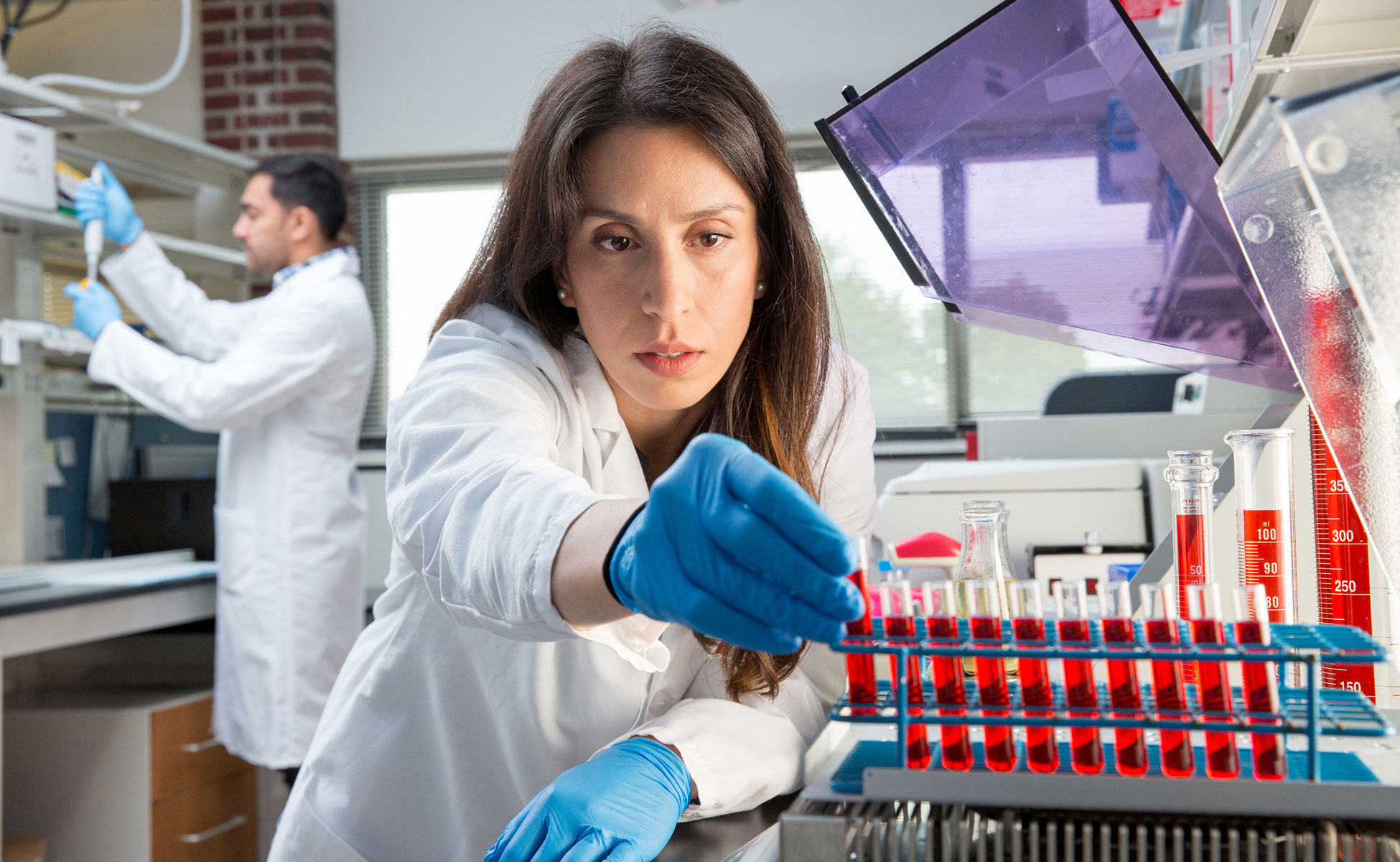You'll need to take the required courses in the Ph.D. Core Curriculum and the biochemistry & molecular biology discipline-specific courses listed below. In addition, Journal Club (BCHM 8010) should be taken each semester following entry into the biochemistry program. Research Techniques (BCHM 9200) is taken each semester until candidacy is achieved. Doctoral Dissertation Research (BCHM 9900) should be taken each semester after achieving candidacy. Two (2) credits of Graduate Student Teaching Assistance (BCHM 8311 or 8312) should be taken after year one of the program.
BCHM 1020 General Biochemistry II (4 credits)
This course is designed to present a thorough background of structural biochemistry, molecular biology and metabolism. Topics introduced include foundational principles of biochemistry, protein, lipid, carbohydrate, and nucleotide structure, enzyme kinetics, membranes and signaling, DNA repair and gene expression, carbohydrate, lipid, protein, and purine/pyrimidine metabolism, and the diverse biochemical functions of vitamins.
BCHM 1250 Biochemistry of Gene Expression (4 credits)
In vitro and in vivo aspects of DNA, RNA and protein synthesis are covered in depth by instructors actively doing research in each of these areas. Special emphasis is placed on methods and techniques used to address key questions in the macromolecular processes of DNA replication and repair, RNA transcription and processing, protein synthesis, and post-translational modifications. Students are introduced to principles and applications of molecular techniques and new discoveries in the molecular biology of eukaryotes. Students are provided with a comprehensive reading list.
Choice of one of the following courses:
MCRM 2020 Advanced Immunology (2 credits)
This course covers advanced topics in immunology and deals with both innate and adaptive immune responses. Discussions of special topics are based on published reviews and research articles. The course also examines clinical aberrations of the immune system and a detailed analysis of the involvement of the immune parameters in either augmenting or initiating a disease. Emerging clinical applications of immunological research are also discussed.
BMSM 5150 Principles of Neuroscience (5 credits)
This course will describe and relate neuroanatomical structures and their functional characteristics to the most common diseases of the nervous system. Particular attention is paid to the integration of neuroanatomy, neurophysiology, etiology, epidemiology and principle of treatment as pertinent for nervous system diseases. The goal is to understand neuroscientific basis of neurological diseases (central / peripheral nervous systems and skeletal muscle). This course runs for approximately 8 weeks.
PHRM 2710 Immunopharmacology (2 credits)
Immunopharmacology is a rapidly developing area of investigation that continues to evolve as our understanding of human disease reveals roles for the immune system in conditions such as rheumatoid arthritis, asthma, allergies, and autoimmune diseases as well as in, hypertension, atherosclerosis, ischemic-reperfusion injury, heart failure, and neurodegenerative disorders. This course will provide state-of-the-art information regarding mechanisms that underlie the cellular and molecular basis of immune system responses to a variety of conditions including chronic inflammatory diseases, cancer, COVID-19, autoimmunity and other selected diseases. Lectures will provide a description of the cell types, molecules, and effector mechanisms involved in innate and adaptive immune responses and will emphasize how uncovering immune system responses to disease can be leveraged to develop novel therapies. A goal of the course is for students to appreciate current trends in the field of immunopharmacology including the development of novel antibody therapeutics, gene-based strategies, mRNA vaccines and therapeutics, as well as traditional pharmacological approaches for treating a variety of diseases.
BCHM 2690 Protein Structure & Function (3 credits)
An introduction to the foundations of experimental approaches to current models of protein structure. Topics include protein folding, protein-protein interaction, protein engineering and structure-function relationships
CBAM 1320 & 1330 Histology Lecture & Lab (5 credits)
CBAM 1320 Lectures in Histology (3 credits)
Histology is the study at the microscopic level of the organization of cells in tissues and organs. This organization sets up the foundational principles underlying normal physiology and, from a clinical perspective, why alterations may lead to known pathologies. One goal is for students to appreciate why the spatial arrangement of tissues with organs elaborates physiologic function. During the course, the focus will be on the arrangement of tissues within various physiological systems, including cardiovascular, respiratory, gastroenterology, urinary, reproductive, endocrine, and sensory. Throughout students will be introduced to a variety of microscopic techniques, including light and electron microscopy and immunohistochemistry and immunofluorescence microscopy.
CBAM 1330 Laboratory in Histology (2 credits)Laboratory sessions involve microscopic analysis of slides consisting of human and animal tissues and organs. Students will study tissue sections using microscopes and slides and will lead overview discussions prior to each laboratory session. Laboratory practical exams test knowledge of structural features of tissues and organs, and integrate functional and ultrastructural characteristics that are introduced in CBAM 1320.
Electives (didactic credits only)
Credits: 6 credits
Elective courses vary depending on your program. Students should consult with their graduate program director for available elective options.
Total (Core + Program Specific) = 31-34 credits


